#ancien egypt
Explore tagged Tumblr posts
Text
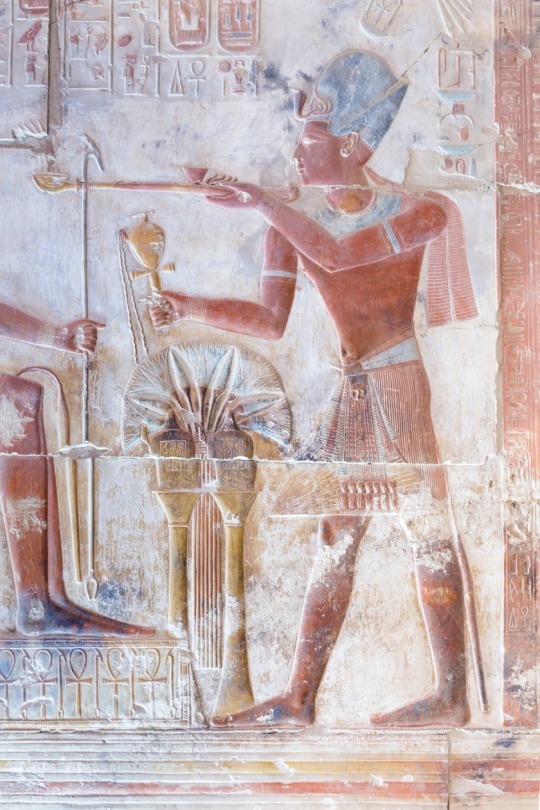
King Seti I (r. 1290–1279 B.C.) depicted within his temple at Abydos
11 notes
·
View notes
Text
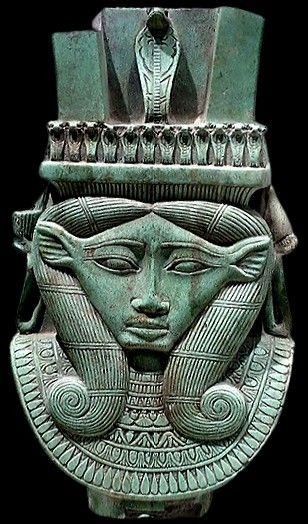
0 notes
Text
The storm is coming to Egypt .. 🌪️ !.
_ The pyramids of giza 🏜️ .
#life#downfall#downfalldestiny#حياة#magic destinations#magical world#magic moments#the pyramids of giza#Giza#Vibes#Visit#Egypt#Ancien#Camel#Tourism#Beauty#Sahara#Desert#Storm#Sand
24 notes
·
View notes
Text

Tatouage de jambe de l'Egypte ancienne dans le style d'Ami James
Tatouages De Jambe #tatouage #Egyptien #ancien #AmiJames #jambe #art #style #histoire #culture #Egypte
0 notes
Video
youtube
Ancient Egypt A Journey Through History and Legacy I Tales and Treks
#youtube#Ancient Egypt Egyptian Civilization History of Egypt Nile River Pyramids of Giza Ramses II Hatshepsut Egyptian Religion Mummification Ancien
0 notes
Video
youtube
Exploring The Wonders Of Egypt: Unveiling Ancient Mysteries
#youtube#Egypt AncientMysteries Exploring Egypt Wonders Of Egypt Travel Egypt Egyptian Culture Historical Sites Pyramids Ancient Civilizations Ancien
0 notes
Note
I've done my research and here are the historical inspirations for the main 18 Legions, for those who want it
1. Black Angels - Arthurian knights and Gregorian monks, High to Late Middle Ages England
2. ???
3. Emperor's children - Rome during the reign of Emperor Caligula, Phoenician society, Hundred Years Knights, Thirty Years' War soldiers, Ancien régime
4. Iron Warriors - Greek warring states, the Red army
5. White Scars - Mongol Empire, Turkish tribes, Toaist principles, China during the Yuan Dynasty
6. Space Wolves - Vikings, Anglo-Saxon tribes
7. Imperial Fists - Holy Roman Empire, Inuit culture, Teutonic Knights
8. Night Lords - Terror Troops, Wallachia under Vlad Țepeș, Congo under Belgian rule
9. Blood Angels - Italy during the Renaissance, Vampire literature
10. Iron Hands - Sparta in Antiquity, Highland Scots, the Gaels
11. ???
12. World Eaters - Gladiators, Beserkers, the Revolt of Spartacus, Attack-Dogs
13. Ultramarines - the Roman Republic, Athenian democracy
14. Death guard - the Battle of Osowiec Fortress, "Attack of the Dead Men", the victims of the Black Plague and the Spanish Flu, German ww1 stormtroopers
15. Thousand Sons - Egypt during the Old Kingdom
16. Sons of Horus - Germanic Tribes, Biblical Fallen Angels
17. Word Bearers - Bronze age civilizations, Georgia during it's Golden Age, The Crusades
18. Salamanders - North African cultures, Roman mythology
19. Raven Guard - Native American cultures, The Gurkhas
20. Alpha Legion - The Order of Assassins, the CIA, Celtic + Greek cultural elements
yes <3
81 notes
·
View notes
Text
White Anubis
1 note
·
View note
Text
Aaah… Bakura should have seen it coming. They should have used another word. But honestly? Yeah. Kat was cute. It was hard to deny it. She had a nice face, with those pretty blue eyes, and her long hair… Well. Bakura wasn't going to go over everything. She was cute. If only it wasn't the only thing she focused on from Bakura's words.
At first Bakura was going to dismiss it, going with something like it would be better if she wasn't a disaster half of the time. But they didn't. Bakura had realized that Kat's self esteem was more fragile than it seemed and that type of joke wouldn't be well received by her. They couldn’t hide their feelings behind little spikes like that with her.
Well. That didn't mean Bakura intended to drop all their walls and be fully honest. But if they couldn’t hide behind a ‘I am the biggest asshole around’ mask, then they would do the opposite and go harder on their words so it wouldn't look like Bakura was embarrassed to admit it.
Bakure looked at Kat and grinned. “Do you have to ask that after what happened in the bath?” Their free hand went under Kat's chin and brushed it. “I have good eyes when it comes to notice pretty things.”
(continued from here)
Kat was about to argue that getting a real job wasn't that easy before either, but something Bakura said quickly changed her irritable mood.
She latched onto their arm, smiling and batting her eyelashes up at them. “You think I’m cute?”
((@nb-lesbian-tkb))
#Rp#sesshy380#Bakura: I can't be an asshole to hide feelings™ so time to go full 'Thief King' mode and act like I'm perfectly conformable with that#(This is the attitude that created the rumors of Bakura spending the night with many girls in Ancien Egypt)
4 notes
·
View notes
Text

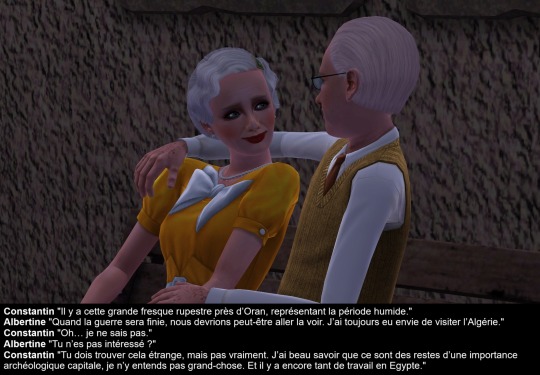




Automne 1941 - Le Caire, Egypte
4/4
Au grand dam de ta mère, il a fallut une fois encore commander une nouvelle paire de lunettes. Il s'agit de la dernière en date.
Je ne l'aime pas, mais aux dires de tout le monde, ces lunettes me vont à merveille et leur forme me donne au contraire un air plus abordable. Elles ont la forme ovale de mes vieilles lunettes, mais elle sont plus larges, avec une monture en fer assez fine. Malgré tout, je n'en suis pas satisfait, mais cette fois, sans que je puisse réellement comprendre en quoi. Cela n'a fait que rehausser ma mauvaise humeur pour un temps, mais je m'y suis habitué. Elles sont peut-être maudites, car lors d'un ballade avec ta mère, il s'est mis à pleuvoir d'un coup des trombes d'eau. Cela ne m'était jamais arrivé, et selon le marchand qui nous a abrité sous sa guérite, il avait rarement vu un tel épisode. M'imagines tu retourner fouiller avec ces aimants à malchance perchées sur le nez ? Toutes mes découvertes englouties sous des flots ou des sables mouvants ? Ta mère dit que je dramatise, et je n'ai jamais été du genre superstitieux, mais je ne vois aucune autre explication. Après tout, personne n'a jamais pu prouver que les fantômes que voyait Grand-Mère n'existaient pas. Et c'est dans ses vieux jours qu'elle a commencé à les voir me semble t-il.
Je suis moi-même dans mes vieux jours, d'une façon assez avancée je dirai même. Je doute de voir venir un jour mes cent ans, et pourtant, j'ai encore tant de choses à faire. C'est pour cela que cette guerre m'exaspère tant. Et puis, cela me manque de ne plus te voir, toi et tes sœurs bien sur. Je pense à elles tous les jours, ainsi qu'aux miennes. Mais j'essaie de ne pas laisser tout cela me submerger, sinon je sais que je ne parviendrais plus à respirer. Je ne peux que t'enjoindre à faire de même, bien que je réalise à quel point cela peut paraître compliqué. Se plonger dans une activité est un excellent dérivatif, et en cela je te rejoins. Mais pense également à préserver ta santé et ton intégrité physique. Tâche de ne pas remettre les pieds sur un champs de bataille. Adelphe m'a toujours dit qu'il y a de nombreuses façons de se battre pour ses idées, et tu l'as prouvé chaque jour depuis l'obtention de ton diplôme. Ta mère m'a dit avec consternation que tu avais frappé un homme avec lequel tu n'étais pas d'accord. Entre nous, je t'envie, car je n'ai jamais été capable de frapper personne, même pour de bonnes raisons.
Sache que mes pensées vont toujours vers toi, et que même si je n'y crois pas, mais que quand je lis la grande supplique à Amon, j'espère que ses pensées aussi se tournent vers toi et vers notre famille :
Celui qui entend les suppliques de qui est dans l’affliction, Dont le cœur est bienveillant lorsqu’on crie vers lui. Qui délivre le timide de la main du violent, Qui juge entre le malheureux et le puissant.
Professeur C. Le Bris
Transcription :
Albertine « Alors ça, si j’avais pu me douter que je serais prise sous une averse en Egypte. »
Constantin « Oh, il fut un temps où cela était sans doute plus commun. Cela devait donner un air plus frais. Désastreux pour la conservation des vestiges. »
Albertine « Cela fait tout de même 14 000 ans. Et puis, si j’ai bonne mémoire, bien avant la période pré-dynastique, les ancêtres de nos chers anciens égyptiens vivaient dans de grandes plaines verdoyantes au bord du lac Tchad, là où ne demeure aujourd’hui plus qu’un désert. »
Constantin « Il y a cette grande fresque rupestre près d’Oran, représentant la période humide. »
Albertine « Quand la guerre sera finie, nous devrions peut-être aller la voir. J’ai toujours eu envie de visiter l’Algérie. »
Constantin « Oh… je ne sais pas. »
Albertine « Tu n’es pas intéressé ? »
Constantin « Tu dois trouver cela étrange, mais pas vraiment. J’ai beau savoir que ce sont des restes d’une importance archéologique capitale, je n’y entends pas grand-chose. Et il y a encore tant de travail en Egypte. »
Albertine « Tu ne videras pas le désert à toi seul. »
Constantin « J’en ai bien conscience, et puis, je commence vraiment à avoir mal aux genoux. Je devrais aller voir un médecin. Oh, quel dommage que je ne puisse pas demander à Rose de m’examiner ! Elle a passé une grande partie de sa vie à soigner l’arthrose, voilà qui m’aurait bien arrangé. »
Albertine « Dire que nous avons passé du temps à nous moquer de tous ces vieillards qui venaient se plaindre de leurs articulations. »
Constantin « Moi ? Mais jamais ! »
Albertine « Non, elle et moi. Cela nous semblait si loin. Comme si jamais nous n’aurions ces maudites douleurs. »
Constantin « Oui, c’est le triste constat de la vieillesse. Et pourtant, il me semble que c’était hier encore que je manquais de mourir de déshydratation sur le chantier de Monsieur Hautbourg. Il m’a sermonné comme un gamin ce jour là. J’étais juste trop fier et têtu pour demander de l’eau, je ne pensais qu’à fouiller et dessiner le plus possible. A présent, c’est à peine si je peux me mettre à genoux dans le sable et me pencher pour examiner une inscription. »
Albertine « Oui, mais comme tu as, sur les conseils de ta merveilleuse épouse, embauché un secrétaire, tu n’en as plus besoin. »
Constantin « Certes, mais cela me manque. Je n’ai qu’une envie, repartir au sud avec toi. Dormir dans une tente battue par les vents, travailler du matin au soir, t’entendre encore me houspiller quand je refuse de venir manger et surtout, regarder les étoiles la nuit, quand tous les ouvriers sont partis se coucher. »
Albertine « Ces nuits là me manquent aussi. »
Constantin « Nous pourrions emmener les filles. Jeanne aurait bien besoin d’être confrontée à un confort rudimentaire et Julienne à un peu d’autonomie. C’est bien comme cela que j’ai appris, moi ! »
Albertine « C’est une très bonne idée. Et après, tu m’emmèneras à Oran voir ces fameuses peintures rupestres. Pour une fois, tu seras un simple visiteur, pas un chercheur en vadrouille. »
Constantin « Bon, si tu y tiens, ma chérie... »
#lebris#lebrisgens5#history challenge#legacy challenge#decades challenge#nohomechallenge#sims 3#ts3#simblr#sims stories#Albertine Maigret#Constantin Le Bris#Marc-Antoine Le Bris#Martial Hautbourg#Julienne Le Bris#Jeanne Marie Jacqueline Le Bris#Adelphe Barbois#eugénie le bris
11 notes
·
View notes
Text
La pyramide de Khephren, en Egypte, où des structures souterraines auraient été mises à jour. Cette découverte n’a fait l’objet d’aucune publication sérieuse et est l’œuvre de personnes au profil douteux sur le plan scientifique. Ces huit piliers seraient en fait des puits verticaux, creux à l’intérieur et entourés de chemins en spirale descendants. Ces derniers descendraient jusqu’à une profondeur de 648 mètres et reposeraient eux-mêmes sur deux grandes structures cubiques d’environ 80 mètres de côté. Cette structure s’étendrait même sous les deux autres pyramides du complexe de Gizeh (Kheops et Mykérinos). Ce qui est faux.

L’équipe du « Projet Khephren » à l’origine de ces affirmations est notamment composée de Corrado Malanga. Il se présente sur son site comme un ancien chercheur en chimie de l’Université de Pise. Passionné par les OVNI, il a notamment travaillé sur les enlèvements par des extraterrestres. Un autre membre, Armando Mei, est quant à lui journaliste et « égyptologue autodidacte », adepte des théories mystiques sur l’origine des pyramides
4 notes
·
View notes
Text
Percy, Larrey and the army administration (1799)
The one thing Dominique Larrey is best known for are the ambulances volantes or flying ambulances who for the first time went onto the battlefield to tend to the wounded. Now, many descriptions of this take it to mean that for the first time the wounded were tended to while the battle was still going on, and that this was absolutely sensational. Which is true to some degree but was not actually the point.
In the first place, the point was to get the medical service to the wounded at all.
According to the old Ancien Régime army regulations still in place at the beginning of the Revolutionary wars, the surgeons had to remain at least one league (~5 km) behind the battle lines and were expressedly forbidden to enter the battlefield before the fighting had ended. Only then the wounded should be carried off the field to some secure place where hospitals could be installed and the surgeons were called in to take care of them.
But even that remained a merely theoretical option most of the time. As taking care of the wounded was, at best, an afterthought for the army administration, the medical service was lucky if they were given enough bandages and other material they needed for their job. There was no provision for how they would follow the army and transport this materal.
So usually, they tried to gather some carts to carry what was to carry, and other than that, they walked. Once the battle had ended and the surgeons and their helpers were informed they could now enter the battlezone and see if somebody in it could still be saved, they had to set out on roads that were utterly overcrowded, at a time when all horses had already been required for the cavalry and the transport of canons. Hardly suprising, they often only reached the place where the wounded were between 24 or even 36 hours later.
It’s true that Larrey as early as 1792/3 had managed to establish a first battlefield unit of surgeons, but this was an experiment and mostly due to one sympathetic general. With Larrey himself being only a rather obscure surgeon among many at the time, this innovation also happened on a miniscule scale, literally only a handful of surgeons following one army unit on horseback with some bandages in their saddlebags. While it did receive lots of praise, it did not change a thing about the general situation. Even later, when Larrey came in close contact with one general Bonaparte who similarly granted him the opportunity to put his ideas into practice, this was restrained to (parts of) the armies of Italy and Egypt.
The overall situation becomes evident when reading the 1799 entries in the Journal de campagne of Pierre-François Percy, who would later, for the bigest part of the First Empire, become head surgeon of the French army (and thus Larrey’s boss). Percy himself, older and much more renowned than Larrey, at the time was already somewhat higher up the ladder but still helpless in this point. Throughout several decades and against different types of government he fought tooth and nails to improve the situation for the medical service and to wrestle money, material, but also some independence and autonomy out of an army administration utterly unwilling to give up its authority. While it seems Larrey and Percy on several occasions did not see eye to eye (as much as it was possible for good-natured Percy to be cross with somebody, especially as he greatly respected Larrey’s skills and expertise), they were united in this constant struggle against the army administration.
Unlike Larrey’s memoirs Percy’s notes were a mere diary, entirely personal and never intended for publication. They also have the advantage of being, for the biggest part, almost written day-to-day and on the spot, so they offer a very immediate view on what was going on. The main difference between Larrey’s and Percy’s writings, in my opinion, is their tone: Larrey writes military memoirs, he is at the frontline and shares the dangers and glories of the battlefield, and even the descriptions of successful surgeries add to the imperial glory (and to the author’s personal glory, of course). Percy, as to him, arrives later, with the actual medical staff, he is not in Napoleon’s immediate entourage and sees what happens behind the army: the destruction, the ruined villages, the diseases spreading from soldiers to locals, the utter insufficiency of what he is given to work with. The dark side of the story, so-to-speak.
The quotes below are from March 1799, about the surgeons following the vanguard of the army crossing the Rhine at Kehl. Nothing fancy, just some evidence of how little attention was paid to the needs of the army’s medical service.
In the vanguard ambulance marched, on foot, as is customary, the surgeons of all ranks attached to its service; the chiefs had not had time to obtain horses; the young men had not had the means; and yet they were all newly fitted out, and on their clothes shone the new embroidery distinguishing their ranks and professions.
Which apparently already was a big deal – at least now they looked as if they were an actual part of the army. But other than that, not much had changed, despite new regulations:
They were to be given a wurst of the mounted cannoneers to transport them wherever the troops went, and above all to enable them to faster and more readily reach the battlefield, where surgeons on foot usually arrive only after running and hastening more or less great a distance, which exhausts them, puts them out of breath and makes them, consequently, ill-suited to helping the wounded.
A wurst being a nickname for a certain type of longish carriage:

Percy had, after an exhausting struggle, managed to get permission to use such vehicles. Theoretically.
The proposal I had made to our generals to provide my colleagues in all the divisions, and especially in the vanguard, with this kind of lightweight carriage, on which ten individuals can ride astride without being hindered, and the explanation I had given them of the singular advantages to be gained for the safety, promptness and efficiency of the service, pleased them so much that they immediately ordered several of the said wursts to be placed at my disposal, unharnessed, which was done with pleasure and eagerness by the senior artillery officers concerned by this object; but the ambulance crews had to provide the horses themselves, and this was the stumbling block for our project.
Because obviously, in order to receive the horses, the medical service had to refer to the army administration.
The horses were not refused, but hindrances, setbacks and pretexts were multiplied, and the wursts drawn from the arsenal for the relief of the surgeons and the well-being of the wounded had to be returned, because it would perhaps have been a dangerous spectacle to present that of medical officers in carriages, they whom a system of malice, oppression and humiliation has condemned for so long to be covered in dust and mud: we want them to go on foot and be unhappy; otherwise, say some administrators, they'd become too insolent.
And while Napoleon was quite ready to honour some high-ranking personalities of the medical service, Percy and Larrey among them, the overall situation remained unchanged under his rule, too.
25 notes
·
View notes
Text
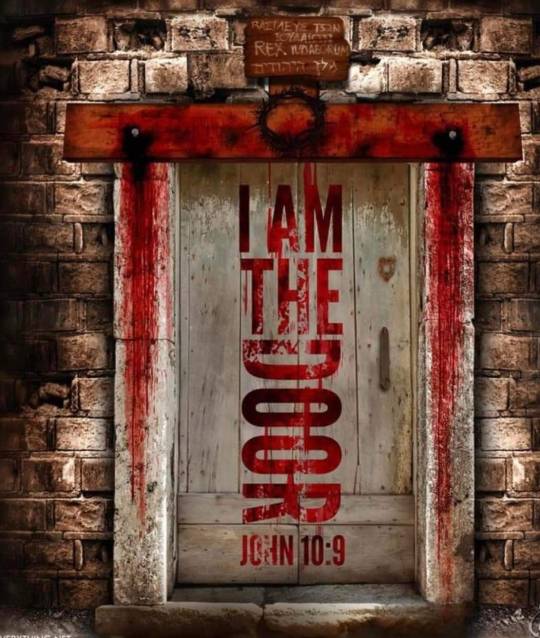
👉 YESHOUA (Jesus) EST LA VRAIE PORTE.
Il est l’Agneau de Pessah qui a été immolé pour nous et l’ange de la mort est « passé outre » (Pessah) et il n’a pas touché les hébreux. .
👉 LA VRAIE FETE DE PAQUES EST SELON LE CALENDRIER JUIF.
👉 En 2023, la Pâque juive est célébrée à partir du Mercredi soir 5 Avril au Jeudi soir 13 Avril 2023 .
👉 Nous sommes dans la période de la vraie Fête de la Paque juive « Pessah ».
👉 La Fête de la Pâque dure 8 jours.
👉 En Egypte , le peuple d’Israël était esclave depuis plus de 420 ans .
La dernière nuit de leurs esclavages le sang des agneaux étaient appliqués sur les linteaux des portes des hébreux qui étaient esclaves en Égypte .
👉 Ce sang les a préservé de l’ange de la mort qui passé devant les maisons des hébreux.
👉 L’ange de la mort voyait le sang sur les linteaux des portes et il passait outre et les hébreux étaient protégés par le sang.
👉 Le lendemain était leur délivrance .
Pharaon les a laissé partir.
👉 Ce récit historique du peuple juif préfigure ce que Jésus allait accomplir pour nous lorsqu’il mourut à La Croix.
👉 Il y a 2000 ans Jesus a été crucifié et son sang a coulé pour vous libérer si vous l’acceptez comme votre Sauveur personnel .
👉 Lorsque Jésus est arrivé au Jourdain, Jean baptiste a prophétisé sur Jesus et a dit à voix haute :
👉 « Voici l’agneau de Dieu qui hôte le péché du monde, lui (Jésus) vous Baptisera (immergera) du Saint Esprit et du Feu de Dieu ».
👉 Jésus est notre Agneau de Pâques qui a été immolé sur La Croix pour nous préserver de l’ange de la mort.
Son sang a coulé pour nous purifier et nous libérer.
👉 Si vous demandez pardon pour vos péchés et acceptez Jesus comme votre Sauveur personnel , le sang de Jésus sera appliqué sur les linteaux de votre cœur pour vous pardonner, vous purifier, vous protéger et vous libérer de l’emprise de Satan (pharaon) sur votre vie.
👉 Vous pourrez sortir et être libérer de l’esprit d’Égypte pour partir vivre une nouvelle vie avec Jésus Christ.
Pharaon (Satan) sera obligé de vous libérer.
Célébrons Jesus notre « Pessah » notre protecteur et notre libérateur.
Pour huit jours, commence « Pessah » la Pâque juive.
👉 Actuellement Le peuple juif raconte en famille et en communauté le récit de la sortie d’Égypte et l’évocation des miracles qui s’y sont déroulés...
on lit la Haggada qui sont des textes anciens qui retrace l’histoire de l’Exode des Hébreux hors d’Égypte où ils étaient réduits en esclavage.
Tous les Israélites doivent rappeler et transmettre dans leurs familles le souvenir de la libération divine.
Célébrons en temps que croyants en Yeshoua (Jésus le Messie) cette fête qui parle de notre nouvelle naissance en Jesus christ qui nous a libéré de la mort spirituelle et de l’emprise du péché.
BONNE FÊTE DE PÂQUES
(Serge Fortunato)
4 notes
·
View notes
Photo
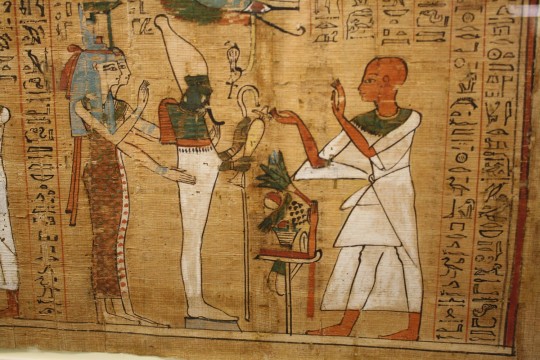
La Mort en Égypte Ancienne
Pour les anciens Égyptiens, la mort n'était pas la fin de la vie, mais seulement le début de la phase suivante du voyage éternel d'un individu. Aucun mot de l'égyptien ancien ne correspond au concept de "mort" tel qu'il est habituellement défini, à savoir "cesser de vivre", puisque la mort n'était qu'une transition vers une autre phase de l'existence éternelle d'un individu.
Lire la suite...
2 notes
·
View notes

